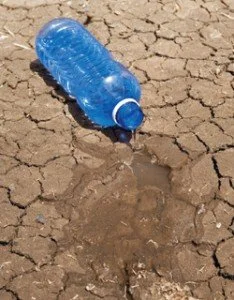The Wilderness and the Borderlands: 4th Week of Lent
03-17-2015
By Rosalyn Bates
“I Thirst” (John 19:28)
Jesus has no taste in his mouth, even though another Old Testament scripture is fulfilled here. Psalm 69:21, “a plea for God’s deliverance and lament about the physical and emotional distress and the persecution of others,” captures Jesus’ desperation on the cross. Soldiers, who represent the oppression of the government, are insulting and shaming him. Heartbroken, he looks for a friendly face and a shoulder to cry on, but he gets no love. The Roman system has profiled him and considered him to be a problem while the Jewish council voted that he should die so that people would not start a riot. What these colonial powers are doing to Jesus is a way of hiding their flaws. Jesus is charged for making claims about his identity.The system with its savage, tasteless approaches in the name of justice, has left Jesus hanging—literally. Here he hangs between two criminals as an object lesson.
It is after the ninth hour Palestine time, like after 3 pm Chicago time, and here Jesus hangs. The jar or bowl, this vessel, of sour wine nearby is FULL while Jesus, God’s vessel, is close to empty. His strength is almost all gone. He is emptying himself. He is emptying himself of the privilege of being equal with God, and becoming obedient unto death coming soon. His body is exposed to the hot, humid elements of the climate. He is physically vulnerable. His tongue is probably sticking to the roof of his mouth.
So Jesus says it: “I thirst,” or “I am thirsty.” This is a shift from the other I AM statements that highlight his divinity. “I AM the Bread of Life, I AM the Light of the world, I AM the Door of the Sheep, I AM the Good Shepherd, I AM the Resurrection and the Life, I AM the Way, the Truth and the Life, and I AM the Vine. We see Jesus, the flesh of his feet like bronze, the texture of his hair like lamb’s wool, Mediterranean-sun-kissed skin and unbroken bones, suffering. Jesus reveals his humanity. Through his pain, he finds enough strength to take initiative and say that he wants a drink. He is expecting, in the very least, for his thirst to be satisfied on a minimal level. As the Living Water Himself, he knew the value and the vitality of water when he offered it to the Samaritan woman at Jacob’s well in the heat of the day. When Jesus says “I thirst,” the soldiers give him a sponge dipped in sour wine—wine mixed with vinegar. Neither wine in general nor sour wine can truly give him life. Even though he receives it, Jesus cannot be fully satisfied with this common pain-reducing mixture. This is an additional disappointment. The soldiers gave Jesus what was common for them to drink and convenient for them to give. Wine, the drink of joy and celebration, has changed forms. It is short of the ideal.
The resilient history of African people confirms that Africans worldwide still have expectations. We expect to live in a society that equally values all of its citizens, regardless of race, class or gender; to be portrayed respectfully by the media; to vote without interferences. We expect equitable wages, access and resources. We expect our children to attend school and walk the streets without fear, fear of being gunned down by hostile, random shooters or victimized by figures who claim to serve and protect. Even with all of the strides, ranging from the fall of apartheid in South Africa to having a president of color in the USA, people of African descent in the diaspora have been left hanging with what has been given out of convenience. People of African descent have had unmet expectations for many years.
Jesus came in flesh to enter our human realities instead of exempting himself from the tough circumstances of everyday life. He dealt with the struggles that come with mainstream culture undervaluing, stifling and misconstruing his identity. In the other gospels, someone else offers him a drink. In John’s account, Jesus is living assertively–and even dying–with hope that is strong enough to prompt him to SAY something, even when he is extremely vulnerable and fragile . Jesus makes it known: “I thirst. I am thirsty.”
In times of crisis, we need to gather our strength to take initiative and say what we want. Given all that we have endured as a people, our requests, like the one Jesus made, are not unreasonable. We are not asking too much. What we receive may not be fully what we want, but that projected outcome does not justify a passive or silent response to our painful predicament.
Today, we can recognize that our Redeemer assertively faced less-than-ideal situations. Jesus becomes a libation, a poured out offering in atonement for our sins and for the sins of the world. He does not turn away from human suffering, but rather identifies with us in it, makes meaning of it, and will one day fully eliminate it. Until then, we are challenged to use our voices with dignity and drink in acceptance of Christ’s sacrifice as we ask and answer the question:
“What shall I render to the Lord
For all His benefits toward me?
13 I will take up the cup of salvation,
And call upon the name of the Lord.
14 I will pay my vows to the Lord
Now in the presence of all His people.” (Psalm 116:12-14)
Bio sentences: Rosalyn Bates is a Master of Divinity graduate of McCormick Theological Seminary. She serves as an assistant pastor of a church in suburban Chicago, IL. This post was preached by Rosalyn at the annual Seven Last Words service at Pullman Presbyterian Church on Good Friday of 2014.
“I Thirst” is one of the Seven Last Words of Christ, on which PASO organizes an annual Good Friday service.




